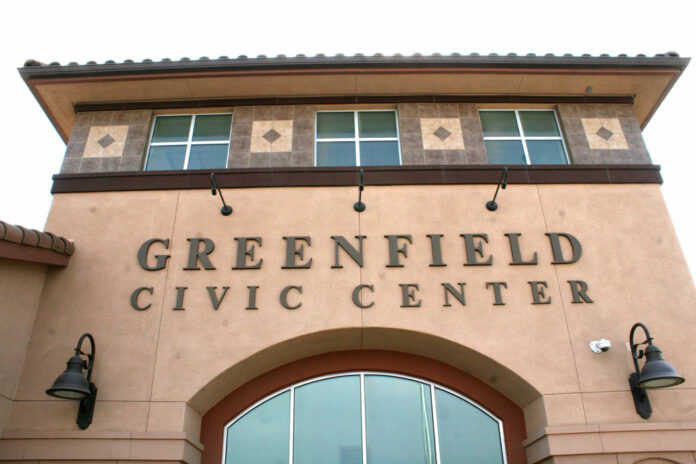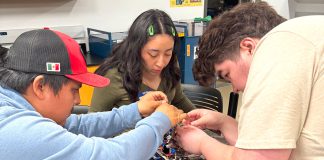GREENFIELD — Greenfield City Council has approved the acceptance of $461,000 in state funding in order to respond to local youth programs designed to divert teens away from crime.
The funds could only be accepted with a 100% funding match from the city, with the intention of being used for a school resource officer from Greenfield Police Department to serve Greenfield High School.
After much public opposition at its Nov. 10 meeting, the council voted 4-1 to accept the funds, with Mayor Pro Tem Yanely Martinez casting the opposing vote.
Public comment amounted to more than an hour, with community members ranging from students to recent graduates to older adults, all in opposition to the idea of having a school resource officer present at the high school.
They cited the concept of a school to prison pipeline and said an SRO serves to create criminal records for misbehaving teens, thus locking them into the criminal justice system at an early age. Others cited intimidation toward youth, whether overt by police officers or inferred by the presence of a police vehicle in front of campus.
“I know it’s not easy speaking to a bunch of public leaders,” said Martinez to the members of the public who gave their input. “I’m so glad to see that you guys are voicing your concerns, and yes, we here, the five here, that are currently your council, are here to listen to you and we appreciate the fact that you guys came forward.”
City Manager Paul Wood explained the state and city entered into an agreement for funding, and the approval needed to move along as already determined, but could potentially be changed after the official acceptance was completed.
“The City of Greenfield has in the past utilized the services of Sun Street Centers to provide a scope of services associated with the continued implementation, operation, management, staffing and administration of a youth diversion program for the South Monterey County Joint Union High School District and the City of Greenfield,” Wood said. “Services provided include case management to youth referred to the program, linkage to pro social youth activities and parent education using evidence-based programs. Sun Street Centers works with the city to ensure continued operation of the program and its related services.”
Wood noted that coordination with the police department ensures timely and appropriate implementation of the program. The current design of the program means Sun Street works with youth referred by law enforcement, school administration or probation.
The city applied for the grant in June 2020, for the amount of $461,170.
“We chose to match this with funds that we expect to spend on a school resource officer program,” Wood said. “We realize that a segment of the community has reservations about an SRO program, but staff looked at this as a separate item, not having to do with the substance of the grant. If the council would like to hear those concerns, staff could set up a future council meeting to discuss the topic.”
Wood explained the city has learned that changes to items related to the matching commitment could possibly be altered afterward.
Community opposition to an SRO requested the city instead divert such funding to other youth diversion programs, such as counselors, positive outlets or other intervention methods that don’t bring in the presence of a police officer.
“Staff strongly recommends the acceptance of the grant … as it is, so that Sun Street Centers can move forward with providing the services that seemingly everyone is in favor of,” Wood said. “This is not a referendum on SROs. It’s the acceptance of a grant.”
Denise Velasquez, program manager for Sun Street’s Youth Diversion Program, explained the program’s logistics and how it aims to prevent a school-to-prison pipeline by instead creating a road to success.
“The purpose of this grant is to intervene and prevent a youth’s involvement in the justice system,” Velasquez said. “The road to success program is based on the premise to end the school-to-prison pipeline through education, parenting, community involvement and wrap-around services that involve local resources, like mental health and other community resources that everybody is asking for.”
She said the program takes a youth with a criminal charge and gets the charge dismissed through completion of their diversion efforts.
“That leaves them with a second chance of having a clear record and avoiding the system altogether, hopefully with some new skills that they can take with them to move forward,” Velasquez said.
She noted the program has an average recidivism rate of 8% over the past five years, which equates to a 92% success rate with the youth they’ve worked with in South Monterey County. Those numbers were compared to the state’s average diversion rate of 74% success and the national average of 45%.
“For the city council to not move forward with the BSCC grant would mean that the strong family support system we are helping to build will weaken families that are seeking better futures for their children,” Velasquez said. “You must agree to the original contract before you can ask to change it.”
She added that Sun Street is open to making changes and will be flexible; however, the current wording only allows for referrals from law enforcement.
“We need to get the services in and then we can work on building a better model going forward,” said Andrew Tipton, a council member. “Just because we say it’s going to be tied to an SRO right now, that doesn’t mean we can’t go through and say now we’re going to apply for a modification to this grant saying we found a better way to do it.”














